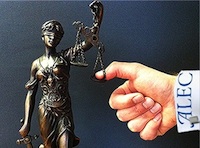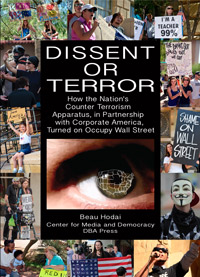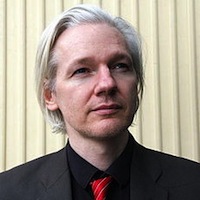Difference between revisions of "Template:Mp-Editors' Pick"
Friday Thorn (talk | contribs) (update) |
Friday Thorn (talk | contribs) m |
||
| Line 9: | Line 9: | ||
News Corp CEO Rupert Murdoch has called public education a "a $500 billion sector in the U.S. alone that is waiting desperately to be transformed." | News Corp CEO Rupert Murdoch has called public education a "a $500 billion sector in the U.S. alone that is waiting desperately to be transformed." | ||
| − | But this "transformation" of public education -- from an institution that serves the public into one that serves private for-profit interests -- has been in progress for decades, thanks in large part to ALEC. | + | But this "transformation" of public education -- from an institution that serves the public into one that serves private for-profit interests -- has been in progress for decades, thanks in large part to ALEC. [http://www.prwatch.org/node/12175 Read more on ''PRWatch'' here]. |
---- | ---- | ||
<h3>[http://www.prwatch.org/node/12172 Justice Denied: 71 ALEC Bills in 2013 Make It Harder to Hold Corporations Accountable for Causing Injury or Death]</h3> | <h3>[http://www.prwatch.org/node/12172 Justice Denied: 71 ALEC Bills in 2013 Make It Harder to Hold Corporations Accountable for Causing Injury or Death]</h3> | ||
by [http://www.prwatch.org/users/35275/brendan-fischer Brendan Fischer] | by [http://www.prwatch.org/users/35275/brendan-fischer Brendan Fischer] | ||
| − | [[Image:ALEC Tilts Scales200px.jpg | + | [[Image:ALEC Tilts Scales200px.jpg|left]]At least 71 bills introduced in 2013 that make it harder for average Americans to access the civil justice system resemble "models" from the American Legislative Exchange Council, or "ALEC," according to an analysis by the Center for Media and Democracy, publishers of [http://www.alecexposed.org/wiki/ALEC_Exposed ALECexposed.org]. |
| − | |||
| − | |||
For decades, ALEC has been a conduit for the oil, tobacco, and pharmaceutical industries to push legislation that changes the rules to limit accountability when a corporation’s products or actions cause injury or death -- such as when a Koch Industries pipeline [http://www.bloomberg.com/news/2011-10-02/koch-brothers-flout-law-getting-richer-with-secret-iran-sales.html explodes and kills teenagers], or when the tobacco or pharmaceutical industries withhold evidence that their products are dangerous. In just the first six months of 2013, seventy-one ALEC bills that advance these "tort reform" goals have been introduced in thirty states ([[ALEC 2013 Bills|see chart on ''SourceWatch'' here]]). | For decades, ALEC has been a conduit for the oil, tobacco, and pharmaceutical industries to push legislation that changes the rules to limit accountability when a corporation’s products or actions cause injury or death -- such as when a Koch Industries pipeline [http://www.bloomberg.com/news/2011-10-02/koch-brothers-flout-law-getting-richer-with-secret-iran-sales.html explodes and kills teenagers], or when the tobacco or pharmaceutical industries withhold evidence that their products are dangerous. In just the first six months of 2013, seventy-one ALEC bills that advance these "tort reform" goals have been introduced in thirty states ([[ALEC 2013 Bills|see chart on ''SourceWatch'' here]]). | ||
| − | “Each of these bills would weaken the legal rights of everyday people who are wrongfully harmed by a corporation or health care provider,” says Joanne Doroshow, Executive Director of the Center for Justice & Democracy, a group that works to protect the civil justice system and fight tort reform. “[The bills] are carefully crafted to provide relief and protections for the industries who wrote them." | + | “Each of these bills would weaken the legal rights of everyday people who are wrongfully harmed by a corporation or health care provider,” says Joanne Doroshow, Executive Director of the Center for Justice & Democracy, a group that works to protect the civil justice system and fight tort reform. “[The bills] are carefully crafted to provide relief and protections for the industries who wrote them." [http://www.prwatch.org/node/12172/ Read more on ''PRWatch'' here]. |
| − | |||
| − | [http://www.prwatch.org/node/12172/ Read more on ''PRWatch'' here]. | ||
---- | ---- | ||
<h3>[http://www.prwatch.org/node/12115 Dissent or Terror: Center for Media and Democracy and DBA Press Document the Surveillance of Occupy Wall Street]</h3> | <h3>[http://www.prwatch.org/node/12115 Dissent or Terror: Center for Media and Democracy and DBA Press Document the Surveillance of Occupy Wall Street]</h3> | ||
Revision as of 15:02, 18 July 2013
Editors' Pick of the Week |
|---|
Cashing In On Kids: 139 ALEC Bills in 2013 Promote a Private, For-Profit Education ModelDespite widespread public opposition to the education privatization agenda, at least 139 bills or state budget provisions reflecting American Legislative Exchange Council (ALEC) education bills have been introduced in 43 states and the District of Columbia in just the first six months of 2013, according to an analysis by the Center for Media and Democracy, publishers of ALECexposed.org. Thirty-one have become law.News Corp CEO Rupert Murdoch has called public education a "a $500 billion sector in the U.S. alone that is waiting desperately to be transformed." But this "transformation" of public education -- from an institution that serves the public into one that serves private for-profit interests -- has been in progress for decades, thanks in large part to ALEC. Read more on PRWatch here. Justice Denied: 71 ALEC Bills in 2013 Make It Harder to Hold Corporations Accountable for Causing Injury or DeathAt least 71 bills introduced in 2013 that make it harder for average Americans to access the civil justice system resemble "models" from the American Legislative Exchange Council, or "ALEC," according to an analysis by the Center for Media and Democracy, publishers of ALECexposed.org.For decades, ALEC has been a conduit for the oil, tobacco, and pharmaceutical industries to push legislation that changes the rules to limit accountability when a corporation’s products or actions cause injury or death -- such as when a Koch Industries pipeline explodes and kills teenagers, or when the tobacco or pharmaceutical industries withhold evidence that their products are dangerous. In just the first six months of 2013, seventy-one ALEC bills that advance these "tort reform" goals have been introduced in thirty states (see chart on SourceWatch here). “Each of these bills would weaken the legal rights of everyday people who are wrongfully harmed by a corporation or health care provider,” says Joanne Doroshow, Executive Director of the Center for Justice & Democracy, a group that works to protect the civil justice system and fight tort reform. “[The bills] are carefully crafted to provide relief and protections for the industries who wrote them." Read more on PRWatch here. Dissent or Terror: Center for Media and Democracy and DBA Press Document the Surveillance of Occupy Wall Streetby PRW Staff DBA Press and the Center for Media and Democracy today released the results of a year-long investigation: "Dissent or Terror: How the Nation's Counter Terrorism Apparatus, In Partnership With Corporate America, Turned on Occupy Wall Street.” The report, a distillation of thousands of pages of records obtained from counter terrorism/law enforcement agencies, details how state/regional "fusion center" personnel monitored the Occupy Wall Street movement over the course of 2011 and 2012.The report also examines how fusion centers and other counter terrorism entities that have emerged since the terrorist attacks of September 11, 2001 have worked to benefit numerous corporations engaged in public-private intelligence sharing partnerships. Read the report: Dissent or Terror: How the Nation's 'Counter Terrorism' Apparatus, in Partnership with Corporate America, Turned on Occupy Wall Street (PDF) Check Out Two New Articles on SourceWatch: Julian Assange and WikileaksSourceWatch.org is an interactive wiki website that is constantly in motion with new articles being created and old ones being updated. If you want to help us grow Sourcewatch and become a volunteer editor click here for more information and check out two new articles below. Key to SourceWatch’s success is clear concise material, fully documented and footnoted.Julian Assange: Excerpt from a longer SourceWatch article on the founder of Wikileaks: “Since June 19, 2012, Assange has been confined to the Ecuadorian Embassy in London. He came seeking “protective asylum” from Swedish and American officials.[1] On August 15, 2012, Britain threatened to invade the Ecuadorian Embassy to capture Assange. A letter from British officials to the Ecuadorian embassy read “ "We need to reiterate that we consider the continued use of the diplomatic premises in this way incompatible with the Vienna Convention and unsustainable and we have made clear the serious implications that this has for our diplomatic relations."[2] Assange was formally granted asylum by Ecuador on August 16, 2012. The decision of the Ecuadorian government cited the fear that Assange would be executed if he were extradited to Sweden and eventually the United States.[3] The decision was in defiance of British authorities who continue to position policemen outside the embassy. The British Foreign Office released a statement after Ecuador formally granted asylum, which read “we are determined to carry out our legal obligation to see Julian Assange extradited to Sweden. We will not allow Mr. Assange safe passage out of the UK, nor is there any legal basis for us to do so. The UK does not accept the principle of diplomatic asylum. It is far from a universally accepted concept: the United Kingdom is not a party to any legal instruments, which require us to recognize the grant of diplomatic asylum by a foreign embassy in this country.”[4] Ecuador responded by citing many international conventions and treaties, such as the Universal Declaration of Human Rights and the Geneva Convention, which they believe requires the United Kingdom to respect their extension of asylum.[4] Wikileaks: Excerpt from a longer Sourcewatch article on Wikileaks controversy and achievements. “Daniel Ellsberg, who leaked the Pentagon Papers, said Wikileaks “is serving our democracy and serving our rule of law precisely by challenging the secrecy regulations."[5] Many media outlets and commentators praised the work of Wikileaks in holding the government accountable and standing up for free speech. Glenn Greenwald of Salon commended the work of Wikileaks and attacked its critics by stating “When WikiLeaks critics devote a fraction of their rage to this form of mainstream American thinking — which, unlike anything WikiLeaks has done, has actually resulted in piles upon piles of corpses — then their anti-WikiLeaks protestations should be taken more seriously, but not until then.”[6] An Economist blog post entitled “In Defense of Wikileaks” read “organisations such as WikiLeaks, which are philosophically opposed to state secrecy and which operate as much as is possible outside the global nation-state system, may be the best we can hope for in the way of promoting the climate of transparency and accountability necessary for authentically liberal democracy.”[7] The ACLU expressed gratitude for the work of Wikileaks but expressed regret at the fact that such an organization needs to exist to hold governments accountable in today’s political system, stating “The Wikileaks phenomenon — the existence of an organization devoted to obtaining and publicly releasing large troves of information the U.S. government would prefer to keep secret — illustrates just how broken our secrecy classification system is. While the Obama administration has made some modest improvements to the rules governing classification of government information, both it and the Bush administration have overclassified and kept secret information that should be subject to public scrutiny and debate. As a result, the American public has had to depend on leaks to the news media and whistleblowers to know what the government is up to.”[8] References
|




